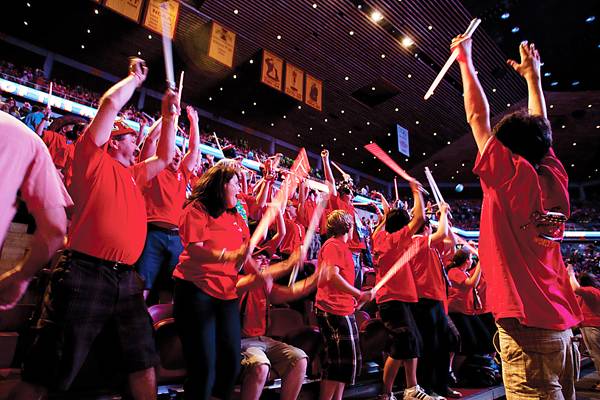ISU events create jobs

Nathan Faessler, from Sanford, Maine, leads his Odyssey of the Mind team in a cheer before the ceremony begins on Saturday in Hilton Colliseum. This years Odyssey of the Mind World Finals was the 30th anniversy of the competition. Photo: Laurel Scott/Iowa State Daily
July 6, 2009
As the university hosts various events on campus, ISU Dining and the department of residence are keeping busy throughout the otherwise quiet summer term.
Summer events help keep the two university units running through the summer term, and allow ISU Dining and the department of residence to offer year-round on-campus employment.
Nancy Levandowski, director of ISU Dining, said revenue generated by the events the university hosts makes it possible for ISU Dining to run during the summer months. She said with the significant drop in attendance in the dining halls, it would be difficult to continue to offer benefits to ISU Dining employees.
Special events on campus over the summer bring in an average total of around $700,000, said Peter Englin, director of the department of residence.
But some years that number is higher.
The Odyssey of the Mind competition, which ran May 27 – 30, for example, brought in around $690,000 for the department of residence alone. Englin said that number is likely similar for ISU Dining for that event. Because Odyssey of the Mind is only held every three years, the department of residence can plan around it as far as planning building improvements and other factors.
“[We have to offer] benefits for staff whether there are 500 or 5,000 people in the dining centers,” Levandowski said.
During the summer, the ISU Dining staff is much smaller than in the fall and spring semesters. For large events, such as the Odyssey of the Mind and Special Olympics, ISU Dining relies on volunteer groups to help staff the dining centers.
“A strong component in our dining program is the hiring of students and, in the summer, we obviously have much fewer students, so we reach out to volunteer groups in the community,” Levandowski said.
She said some of the groups ISU Dining has reached out to in the past are the Gilbert high school football team and the local chapter of the Lions Club, among others.
The most difficult aspect of accommodating large groups is transition from a small to very large number of people, and back again, within a few days. Levandowski said when the university is hosting an event on campus, the dining centers can serve upwards of 5,000 people one week, and the following week, serve only 500.
Throughout the course of the summer’s on-campus events, there is a lot of teamwork between departments, namely ISU Dining and the department of residence, to ensure a great experience for the groups that stay here.
Although every group that utilizes ISU facilities over the summer doesn’t stay in the residence halls, many do stay on campus to take advantage of being within walking distance of the facilities their event will be utilizing, as well as the dining centers, Englin said.
Englin also said staying on campus is typically less expensive than staying in a hotel, and it can enhance the group’s overall experience.
“It’s a great way to showcase ISU as a university,” he said.
The most common remarks made by groups who visit the campus for an event, regard the staff and people they encounter on campus, as well as how beautiful the campus itself is, Englin said.
Since most improvements are made during the summer, there is a considerable amount of coordination between the department of residence and maintenance and contractors hired to work on the buildings.
Englin said that although accommodating large groups who visit campus is important, ISU students are high on the list of priorities as well.
“It can be a tough dynamic to manage,” Englin said. “But the academic-year students are our first priority.”
















